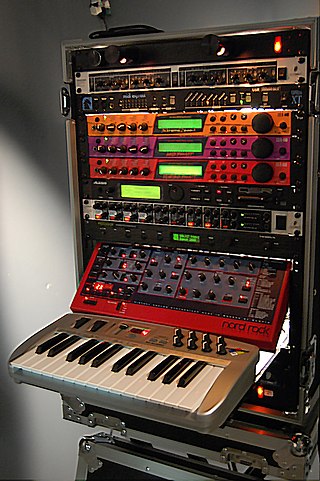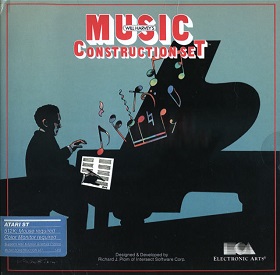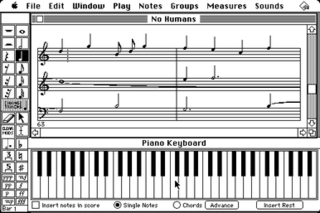| Developer(s) | Aegis Development |
|---|---|
| Initial release | 1987 |
| Operating system | AmigaOS |
| Platform | Amiga |
| Type | Music sequencer |
Aegis Sonix is a music sequencer, software synthesizer [1] [2] and a score editor for the Amiga created by Aegis Development and published in 1987. The application offers a combination of a notation editor and an editor of digital sounds and is able to edit IFF music instruments and other digital sound files.
Commodore International developed but never officially released a sound application called Musicraft for its Amiga series of computers. [3] : 44 Aegis Development bought rights to Musicraft from Commodore and contracted the original developers Mark Riley and Gary Koffler to continue its development. The application - now under the Aegis Sonix name - was released in 1987. [3] : 45 in 1989, Aegis left the Amiga market and sold its software products to a Californian software producer Oxxi, Inc, which continued to use the Aegis brand. [3] : 46
The software includes a score, keyboard, and an instrument editor. The program uses two file formats, the SMUS file format, which is an IFF based tracker module music format, and the INSTR file format which contains the instrument data. [4] Sonix can also read music files created by Deluxe Music Construction Set and works as a MIDI sequencer. [5] : 77 Sonix offers 8 music tracks: the first four are useable for 4 voices of the Amiga sound hardware and also for the MIDI instruments, the other four are available only for the MIDI instruments. All 8 tracks are independent of each other and can be used at the same time. [6] The score editor allows to write notation for sheet music. [5] : 76 The application serves primarily a music synthesis tool for creation of analog or digital sounds and is able to edit IFF music instruments and other digital sound files. [3] : 45
A review in the French magazine Tilt commended easy to use menus [5] : 76 and good documentation and highlighted the combination of a notation editor and an editor of digital sounds as the main strong point of the application. [5] : 77 The AmigaNews magazine evaluated the use of Sonix with MIDI and noted among several benefits few limitations: the program doesn't support recording of a key press on the MIDI keyboard. [6] Sonix was also reviewed in the Keyboard magazine. [7]

MIDI is a technical standard that describes a communication protocol, digital interface, and electrical connectors that connect a wide variety of electronic musical instruments, computers, and related audio devices for playing, editing, and recording music.

Digital music technology encompasses the use of digital instruments to produce, perform or record music. These instruments vary, including computers, electronic effects units, software, and digital audio equipment. Digital music technology is used in performance, playback, recording, composition, mixing, analysis and editing of music, by professions in all parts of the music industry.

A music tracker is a type of music sequencer software for creating music. The music is represented as discrete musical notes positioned in several channels at chronological positions on a vertical timeline. A music tracker's user interface is traditionally number based. Notes, parameter changes, effects and other commands are entered with the keyboard into a grid of fixed time slots as codes consisting of letters, numbers and hexadecimal digits. Separate patterns have independent timelines; a complete song consists of a master list of repeated patterns.
8-Bit Sampled Voice (8SVX) is an audio file format standard developed by Electronic Arts for the Amiga computer series. It is a data subtype of the IFF file container format. It typically contains linear pulse-code modulation (LPCM) digital audio.
Steinberg Media Technologies GmbH is a German musical software and hardware company based in Hamburg. It develops software for writing, recording, arranging and editing music, most notably Cubase, Nuendo, and Dorico. It also designs audio and MIDI hardware interfaces, controllers, and iOS/Android music apps including Cubasis. Steinberg created several industry standard music technologies including the Virtual Studio Technology (VST) format for plug-ins and the ASIO protocol. Steinberg has been a wholly owned subsidiary of Yamaha since 2005.

GarageBand is a software application by Apple for macOS, iPadOS, and iOS devices that allows users to create music or podcasts. It is a lighter, amateur-oriented offshoot of Logic Pro. GarageBand was originally released for macOS in 2004 and brought to iOS in 2011. The app's music and podcast creation system enables users to create multiple tracks with software synthesizer presets, pre-made and user-created loops, an array of various effects, and voice recordings.
A scorewriter, or music notation program is software for creating, editing and printing sheet music. A scorewriter is to music notation what a word processor is to text, in that they typically provide flexible editing and automatic layout, and produce high-quality printed results.

A digital audio workstation is an electronic device or application software used for recording, editing and producing audio files. DAWs come in a wide variety of configurations from a single software program on a laptop, to an integrated stand-alone unit, all the way to a highly complex configuration of numerous components controlled by a central computer. Regardless of configuration, modern DAWs have a central interface that allows the user to alter and mix multiple recordings and tracks into a final produced piece.
SoundFont is a brand name that collectively refers to a file format and associated technology that uses sample-based synthesis to play MIDI files. It was first used on the Sound Blaster AWE32 sound card for its General MIDI support.

Will Harvey's Music Construction Set (MCS) is a music composition notation program designed by Will Harvey for the Apple II and published by Electronic Arts in 1983. Harvey wrote the original Apple II version in assembly language when he was 15 and in high school. MCS was conceived as a tool to add music to his previously published game, an abstract shooter called Lancaster for the Apple II.

Deluxe Music Construction Set (DMCS) is a 1986 music composition, musical notation, and playback package for the Amiga and Macintosh. The program was originally released as Will Harvey's Music Construction Set for the Apple II and other computers, but was redesigned for the deluxe version. DMCS was created by Geoff Brown and published by Electronic Arts (EA). Ariolasoft published the program in Europe under license from EA.
Amiga software is computer software engineered to run on the Amiga personal computer. Amiga software covers many applications, including productivity, digital art, games, commercial, freeware and hobbyist products. The market was active in the late 1980s and early 1990s but then dwindled. Most Amiga products were originally created directly for the Amiga computer, and were not ported from other platforms.
The Ultimate Soundtracker, or Soundtracker for short, is a music tracker program for the Amiga. It is the creation of Karsten Obarski, a German software developer and composer at EAS, a video game development company.

Passport Designs Inc. was a software company that created early music production software, such as the pre-MIDI SoundChaser in 1982. Other programs included Master Tracks Pro and Encore.

Logic Studio is a discontinued professional music production suite by Apple Inc. The first version of Logic Studio was unveiled on September 12, 2007. It claims to be the largest collection of modeled instruments, sampler instruments, effect plug-ins, and audio loops ever put in a single application.

Notion, previously stylized as NOTION, is a computer software program for music composition and performance, created by NOTION Music of Greensboro, North Carolina. NOTION Music was acquired by PreSonus in 2013 which in turn was acquired by Fender Musical Instruments in 2021. Notion 6 is available on Microsoft Windows and macOS, and Notion Mobile is available for Windows, macOS, iOS, Android and Fire OS.
Commodore Amiga MIDI Driver (CAMD) is a shared library for AmigaOS which provides a general device driver for MIDI data, so that applications can share MIDI data with each other in real-time, and interface to MIDI hardware in a device-independent way.
This article deals with music software created for the Amiga line of computers and covers the AmigaOS operating system and its derivates AROS and MorphOS and is a split of main article Amiga software. See also related articles Amiga productivity software, Amiga programming languages, Amiga Internet and communications software and Amiga support and maintenance software for other information regarding software that run on Amiga.